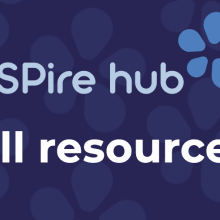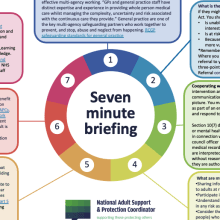Frances Toland is a Social Worker and is Renfrewshire’s Training and Development Officer (ASP). She has contributed many Renfrewshire resources to the ASPire Hub for the benefit of Scotland’s ASP community. These include chronology guidance, the multi-agency risk escalation protocol (MaREP), a trauma-informed approach to non-engagement, and two resources that support care homes to enhance their ASP practice.
The revised Adult Support and Protection (Scotland) Act 2007: Code of Practice (the ‘Code’) was published on 28 July 2022. Organisations and local partnerships then began the work of considering how to adapt and - if required - change their local guidance, procedures and practice to align with the revised Code. The next step was to implement those adaptations and changes. This also required updating learning and development material to align with the new practice expectations.
The level of drive behind the revised 2022 Code from the Scottish Government and partner organisations (such as Police Scotland and the NHS) was important. National multi-agency groups and subgroups were established to drive forward the aspirations of the Code. Reports, such as Kerry Musselbrook’s, Adult Support and Protection: Everyone’s Business, really began to raise awareness that ASP should be of interest to all stakeholders, regardless of their role.
The revised Code re-emphasised that organisations had a ‘duty to cooperate’ as well as re-stating those professionals ‘who may undertake a visit’. This was not new (it had been in the 2014 Code), but the visit aspect of investigatory activity still largely fell to Council Officers. Upon reviewing our ASP training in Renfrewshire, it became evident that our materials primarily reinforced this traditional approach.
In response, Renfrewshire (like many other training and development teams) began evaluating the necessary knowledge and skills required across agencies to effectively meet our ASP Act responsibilities. The goal was to enhance cooperation and multi-agency working to ensure our adults are safe, supported and protected.
Those that have met me at previous meetings, or at ASPire events, may recall that I value using methodology in my work. Part of my approach is to use a mapping process, which helps me organise information. This had been at the core of developing Renfrewshire’s ASP Practice Level Framework (ASP PLF), in which each practice level is organised into desirable knowledge and skills. The ASP PLF draft was shared with partner agencies, making refining the framework a collaborative approach.
The ASP PLF revealed that many skills previously deemed exclusive to Council Officers were also relevant to those with a ‘duty to cooperate’ and potential second workers (as set out on pages 52-53 of the Code). This finding necessitated a reconfiguration of our ASP training programme to reduce duplication; to better reflect the roles and practice expectations of all involved; and to maximise the opportunity for collaborative learning. The methodology used for this was the MoSCoW prioritisation framework:
Must: must have this requirement to meet the organisation's needs
Should: should have this requirement if possible, but success does not rely on it
Could: could have this requirement if it does not affect anything else on the project
Would: would like to have this requirement later, but it won't be this time around
This focused our thinking on the specific content under each module for the specified target groups and practice levels.
Historically, our Council Officer training was a five-day course divided into three modules. It has remained as such, but the reconfiguration transformed this into two modules relevant to the wider workforce. One of these is a two-day foundation module suitable for both Council Officers and potential second workers, such as social workers, senior social care staff, and NHS colleagues (whose area of expertise may be called upon under ASP investigatory activity). This approach ensures that all participants, regardless of their role, receive consistent learning and development. And we still have an exclusive section for Council Officers, in order to address role-specific functions and procedural aspects.
Finally, those who have completed other parts of the modular programme come back together for the ASP investigative interview section. In this, we cover the lead interviewer (Council Officer) and second worker roles. Whilst a modular programme like this does make keeping track of who’s done what a bit of an administrative nightmare, a simple spreadsheet helps keep track of participants’ completion of relevant parts.
Learning and development material is always ‘work in progress’. We have to respond to a shifting landscape. However, feedback from evaluations and discussions in the sessions themselves have indicated that the revised and collaborative training approach has been effective. Participants have expressed newfound understanding and appreciation of ASP roles and procedures, with comments such as:
- ‘I didn’t realise that the Council Officers did so much under ASP’.
- ‘There is so much involved in ASP work that I didn’t know of.’
- ‘I wish I had done this training before I attended an ASP Case Conference, as I now understand more about the purpose of the conference and more about my role, being part of the core group, and implementing the ASP plan’ (this one is from a senior social care staff member).
- ‘I now understand why it is important that a Council Officer is involved when someone is making a disclosure of harm, as the adult has to be informed of their rights and questions need to be asked in a specific way’.
Additionally, we have observed an increase in applications for the ASP courses aligned with Renfrewshire’s ASP Practice Level Framework. Hopefully this can also be attributed to the positive impact of our revised training programme.
In the future, I am hoping that the ASPire Hub will have a section for learning and development resources, so that we can all share material to use or adapt for localised use.




